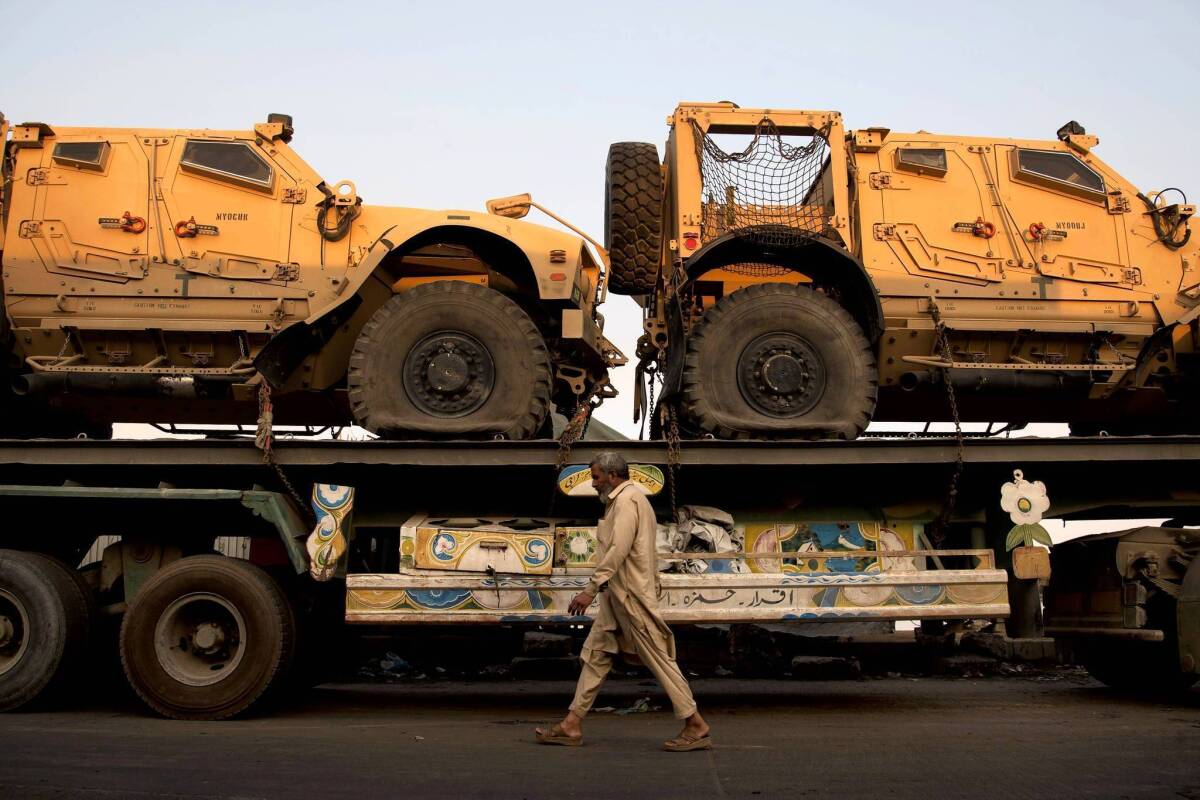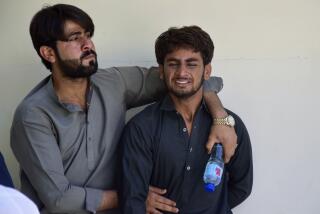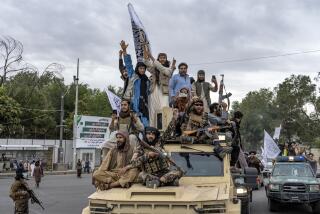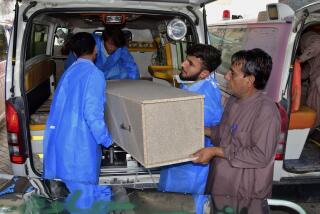Pakistan NATO truck blockade elicits shouts and shrugs

PESHAWAR, Pakistan — It’s been a daily routine for the last week. Dozens of young men rush toward container trucks stopped at a toll plaza outside Peshawar, demanding to see customs documents to ensure the vehicles aren’t carrying supplies for NATO forces in Afghanistan. Pakistani police and paramilitary forces nearby watch the unruly group without intervening.
The attempted blockade was sparked by former cricket star and political leader Imran Khan of Khyber-Pakhtunkhwa province, who vowed late last month to stop all NATO-bound trucks through the area of northwestern Pakistan until the CIA halts its drone campaign in the country.
“Allies of America are traitors,” the men chant, as verses from the Koran blare from a nearby music player. “NATO supplies are unacceptable. Stop drone strikes in Pakistan.”
The campaign is being carried out by the Pakistan Tehreek-e-Insaf and radical Islamist Jamaat-e-Islami parties, both part of Khyber-Pakhtunkhwa’s governing coalition, and its effectiveness and support remain unclear. On Tuesday, Khan visited the area to rally protesters. Party workers say they hope to hit the U.S.-led forces where it hurts, but the effort is dismissed by the North Atlantic Treaty Organization.
“Police have been deployed for the security of the protesters,” said a policeman holding an AK-47 automatic rifle near one of four makeshift protest camps along the main highway. “Our role is to avert a clash between workers and truckers.”
Drivers and their assistants along Peshawar-Torkham Highway don’t have much choice but to comply.
So far, the campaign has been an inconvenience but not much more. Younus Zaheer, a protest leader at the toll plaza, said only one truck with NATO supplies had been intercepted in the last week.
The U.S.-led coalition suggests that any impact is minimal.
“While travel via Pakistan is favored because of convenience, we have flexibility and redundancy for all means of transportation,” said John Manley, a spokesman with NATO’s International Security Assistance Force. “We will use all supply routes available, and we will use all available means, including air and ground, to ensure supplies and equipment continue to move.”
Pakistani officials and truck drivers said 100 to 150 big rigs loaded with NATO supplies were stranded in adjacent Punjab province hoping to wait out the protests, and many transport companies are rerouting shipments through Baluchistan province along the Quetta-Chaman route, the nation’s other major entry point into Afghanistan.
“Imran Khan is wasting his party workers’ energy and time by holding such a demonstration,” said Shakir Khan, a trucker, adding that the protest has had no impact on the number of trucks being loaded at Pakistan’s gateway port of Karachi. “He can embarrass some drivers, but it won’t make any difference to America or NATO. Imran Khan’s just creating some political drama.”
The U.S. drone program in Pakistan, which started in 2004, has been highly controversial among Pakistanis. Even as the government in Islamabad condemns the airstrikes, criticizing the U.S. for the inadvertent deaths of civilians in the counter-terrorism campaign, analysts say some Pakistani officials provide targeting and other intelligence for the effort.
A study by the London-based Bureau of Investigative Journalism estimates that since 2004, 380 drone strikes in Pakistan have killed 2,534 to 3,642 people, including 416 to 951 civilians. The researchers said strikes had killed many more people than Washington has acknowledged.
Truckers say the biggest victim of the protests may be ordinary Pakistanis struggling to earn a living. “If trade is disrupted, then thousands of daily wagers will lose their earning,” Shakir Khan said.
Analysts said Imran Khan, a leader with the Tehreek-e-Insaf party, is trying to make political hay by fanning anti-Americanism. “Everyone knows that anti-Americanism is political currency at this time in Pakistan,” said Hussain Shaheed Soharwardi, a professor of international relations at the University of Peshawar.
Others say Tehreek-e-Insaf tends follow a simplistic approach, blaming all of Pakistan’s problems on “external forces” rather than domestic players.
“The behavior of the party leadership and workers in blocking NATO supplies is insane,” said Khadim Hussain, a Peshawar-based political analyst. “They haven’t even considered the repercussions of their protest.”
Not only are they taking the law into their own hands, Hussain said, but they are also undermining federalism and potentially disrupting international relations. “They’re teaching young political workers that force is the right way to solve problems.”
The protesters say they’ll continue their fight until the CIA ends the drone strikes.
“We have started this movement for Pakistan and for innocent people whose lives are threatened by drone attacks,” said Zaheer, the protest leader. “If the federal government doesn’t stop U.S. drone strikes, then our party and its allies will besiege the parliament in Islamabad until something happens.”
Special correspondent Ali reported from Peshawar and Times staff writer Magnier from New Delhi. Special correspondent Aoun Sahi in Islamabad contributed to this report.
More to Read
Sign up for Essential California
The most important California stories and recommendations in your inbox every morning.
You may occasionally receive promotional content from the Los Angeles Times.










